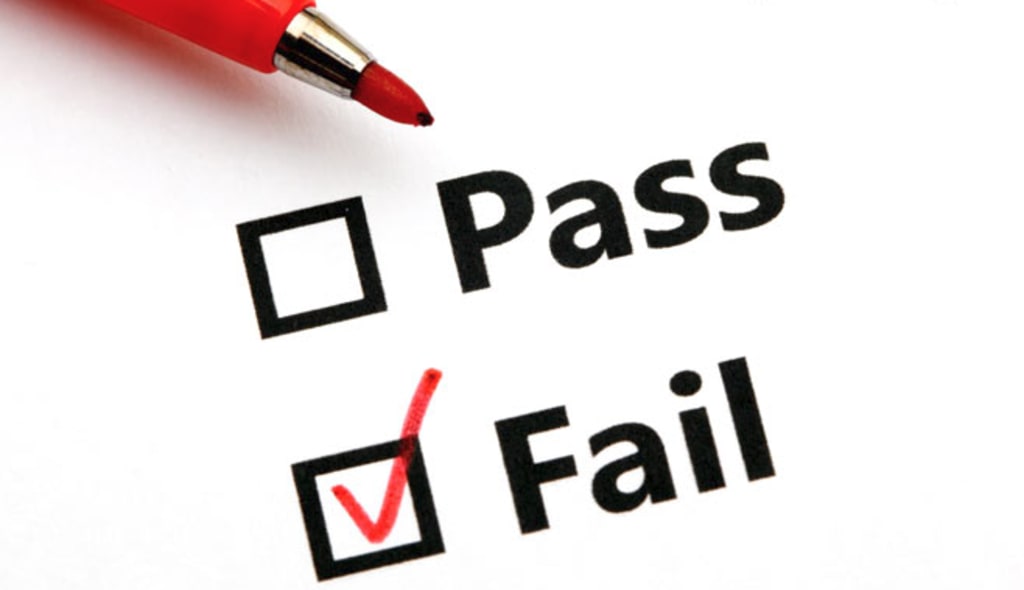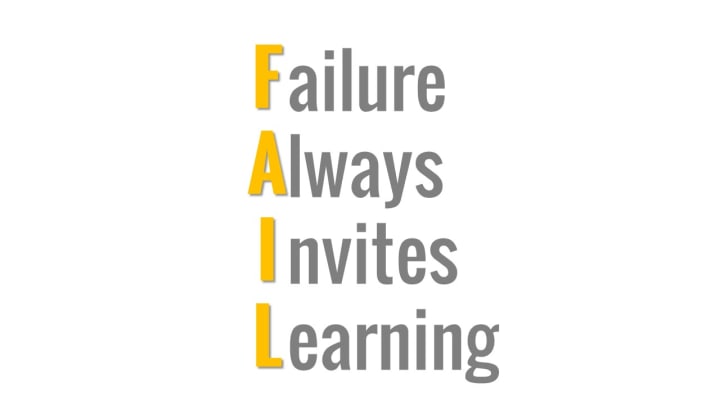Five Reasons Why You Need to Fail a Lot
And Why Failure Always Leads to Success

It sounds weird when you first read it, but you need to fail a lot and often if you ever want to succeed in anything. Many of the greatest successes are built on hundreds and even thousands of failures that paved the way.
Failing sucks. It’s depressive and we even start to feel worthless after a few consistent failures. But when you dig deeper into those experiences, we realize we gain so much more from failure than we ever do from succeeding.
1) You become numb to failure.

Do you remember getting that first failing grade in school? Chances are you had a minor panic attack when you saw that paper. Thinking about how disappointed your teachers are, how mad your parents will be when you get home. That first failure is always the hardest one to take.
As you get older, and you begin to fail a lot more in the classroom and the real world, you begin to feel numb to it. This can lead to two outcomes. You can either not care anymore and believe that you’re doomed to fail for the rest of your life. But that’s not what commonly happens.
As you fail more and more, you learn to bounce back from it faster and faster. Think back to that first failed test in school. Do you remember when you were able to get over it? Maybe it was a few days, maybe it wasn’t until you took your next test.
My first fail came in the fourth grade. Back then if you failed a test, you had to have your parent sign it and return it to the teacher. I was so scared to show my parents that test that I resorted to forging their signature on it (which got me in bigger trouble when my teacher showed it to them during parent-teacher night). I spent the next week stressing that I was going to summer school (which I did) and that my parents would be disappointed in me (which they were, but only for the forging).
Now as a 23 year old adult, I fail a lot more. At least two-to-three major fails and many more small ones per month. But instead of stressing about each fail for long periods of time, I’ve grown to a point where I can easily let it go and focus on the next project.
The point is, it does get easier with time. Soon enough you’ll be able to fail at one attempt and immediately bounce back and get right back on the saddle.
2) You begin to realize where your interests are.

When you’re a child, you have all of these things that you want to do when you get older. You may want to be a firefighter, an astronaut, maybe even a princess of a royal kingdom.
But as you get older, you begin trying new things. You fail at a lot of them, but you learn more about yourself and your interests.
You start to see that you’re more than likely not going to be royalty, so the princess is out of the question. You failed math in school, so maybe an astronaut isn’t in your future. But the great thing about interests is you develop new ones all the time.
When I was a teen I wanted to work in finance at a big company. My high school had a work study program as a course. Students had the opportunity to work for businesses of all sizes. I almost failed that my freshman year because I absolutely hated being in a cubicle. That’s when I realized I wasn’t interested in working in a corporate environment.Through trial and error I found my interests in creating content. I would have never knew about this had I not had the experiences of working in corporate America.
3) Failing keeps you humble.

Never trust a person who has never experienced failure before. 99 percent of the time, they are lying to you. But lets say this person is part of the one percent who actually hasn’t experienced any type of failure.
The most obvious downside of not experiencing failure is that the person may have an inflated ego. They believe they are unstoppable and cannot do any wrong.
Remember the first reason to fail, you become numb to it. If someone really hasn’t experienced failure, then they are overdue for that first fail that will hurt them deeply.
Take Ronda Rousey for example. She’s a former UFC Women's Bantamweight Champion who had an impressive unbeaten streak during her MMA career. Everyone thought she was unstoppable and can finish the fight anytime. Then she finally experienced her first loss when she failed to retain her championship against Holly Holm. This put Rousey in a year long rut. She lost all confidence in herself, avoided talking about the effects of the loss, and stood away from the public eye for awhile. She eventually bounced back and now has an impressive career with the WWE, where she is also undefeated.
When you never experience loss and you feel like you’re on top of the world, that first fall is the steepest. We’re humans, we were born as winners just for being alive.
4) You learn skills through failure.

As weird as it sounds. Failing is rarely a complete failure. You actually learn more from your failures than you ever would from your successes.
Maybe you dreamed of being that entrepreneur and your first business was a complete fail. But from that experience you learned how to start a business, bookkeeping, and many more valuable skills. You can take these skills along when you try again or transfer them to another opportunity.
I’ve failed my fair share of businesses and projects. I’ve created numerous YouTube channels and podcasts that weren’t successful. But I learned storytelling, video and audio editing, and promotion. I failed many business ideas, but I learned Marketing, bookkeeping, and management skills.
Never take a failed attempt at face value, there is always a lesson to be learned from them.
5) Failure makes the successes that much better.

Have you ever really noticed a batting average in baseball? A .250 batting average is seen as a baseline for a hitter and anything over .300 is pretty good. But look at what those numbers mean. Out of every ten at bats, getting two hits is average and getting three is pretty good.
You can fail hundreds and even thousands of times, but those few successes that you have is the best feeling ever. Taking those lessons that you learned and applying them into a new project that works makes all the failures worth it.
In total I’ve failed eight total projects/businesses at 23 years old. I’ve taken the lessons learned from these failures and turned it into two successful projects. My electronics flipping business Game of Phones, where I buy smartphones and other electronics locally and resell them online for a profit. My biggest success thus far has been my Kindle best selling book “Post Like an Influencer, Grow Like a Marketer.” The book is a step-by-step guide to growing and monetizing your Instagram profile. The book has been making me hundreds of dollars every month passively.
About the Creator
Justin Monsanto
Author, lover of podcasts, sports, social media, and content creation.






Comments
There are no comments for this story
Be the first to respond and start the conversation.